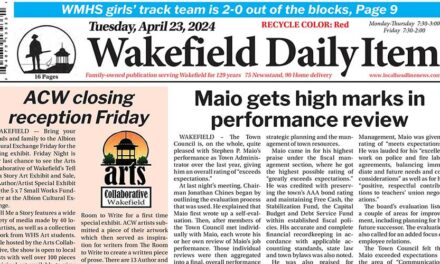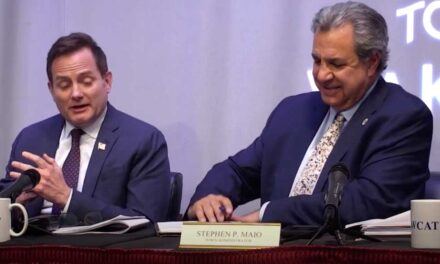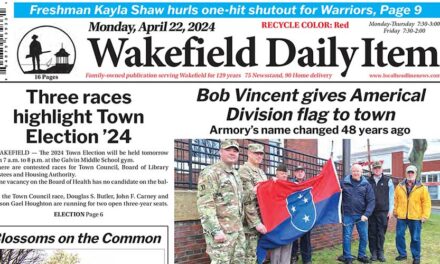Published in the May 6, 2021 edition.
By MARK SARDELLA
WAKEFIELD — The Town Council made a number of appointments last week, one of which was to appoint Building Inspector Benjamin DeChristoforo as the “Zoning Administrator.” This action gives him the power to determine whether proposed changes to a nonconforming single or two-family structure would increase the nonconforming nature of the structure.
The Zoning Board of Appeals had requested by unanimous vote that the Town Council appoint DeChristoforo as the Zoning Administrator. This will allow him to handle minor and routine matters that would otherwise clog the ZBA’s agenda and cause undue delays and inconvenience to homeowners wishing to do small home projects.
The Town Council also voted to increase the membership of the Commission on Disability Issues from eight to nine voting members and appointed Janice Mirabassi of Morisson Road to fill the new three-year term.
The Town Council added three members to the Arts Council (formerly the Cultural Council) and appointed Lori Dupuis, Stephanie Martinovich and Diana Kennedy to fill those new positions.
Four members were also appointed or re-appointed to the Wakefield Human Rights Commission.
Teresa Aravena-Gonzalez and Jeremy Little were re-appointed to three-year terms. New member Eileen Rooney was also appointed to a three-year term. Lindsay Averbook was appointed to a two-year term on the WHRC and Daniela Nedbalek was named to fill a one-year term.
After Human Rights Commission chair Maria Muti reviewed the history of the WHRC, the town Council discussed a new document setting forth the “Purpose, Powers and Duties” of the Human Rights Commission.
The document sets forth the composition and appointment process as it relates to the commission. It states that the WHRC shall consist of 11 voting members, three ex-officio members and one liaison from the Police Department, as follows:
• Nine of the voting members will be appointed by the Town Council. (It was felt that the previous system of joint appointments by the Town Council and School Committee was too unwieldy.)
• One member of the clergy (voting member) will be recommended by the Clergy Council and appointed by the Town Council, and one student (voting member) will be recommended by the Superintendent of Schools and appointed by the Town Council.
• One Police Department employee will be recommended by the Chief of Police and appointed by the Town Council to serve as a non-voting liaison.
• There are three ex-officio (non-voting) members: the Town Administrator, the Superintendent of Schools and the Chief of Police.
The document also sets forth the “Functions and Powers” of the WHRC, which states in part that the commission will “enter into collaborative efforts with civic and community organizations and other community-based groups, including without limitation groups focused on issues of: race, religion, gender, sexual orientation, ethnicity, political ideology, socioeconomic status, and violence in order to promote mutual respect and human rights, accept individual differences, opinions and beliefs and cultivate an inclusive atmosphere of mutual understanding and respect and harmonious group relationships.”
Councilor Jonathan Chines wanted to specifically identify additional groups that the WHRC should focus on. But Councilor Edward Dombroski felt that the document was meant to be broad and cautioned against trying to “micro-edit.”
The Town Council agreed to table a vote on the document to a future meeting.
—————
In other business last week, the Town Council:
• Approved separate requests to fly the Pride Flag at the Americal Civic Center for three weeks in June and to fly the Juneteenth Flag at the Americal Civic Center for one week in June (specific dates to be determined).
• Approved an Inter-Municipal Agreement Between the Town of Reading and the Town of Wakefield related to POST Academy, a collaborative, post-secondary special education program for students 18-22 years of age, housed in the Town of Wakefield. The program provides experiential and educational opportunities in the areas of daily living, employment, community inclusion, recreation, leisure and real world academic skills in order to promote successful transition to adulthood. The main goal for the program is for young adults to gain the necessary skills to become confident, independent, and integrated members in the Wakefield and Reading communities.




